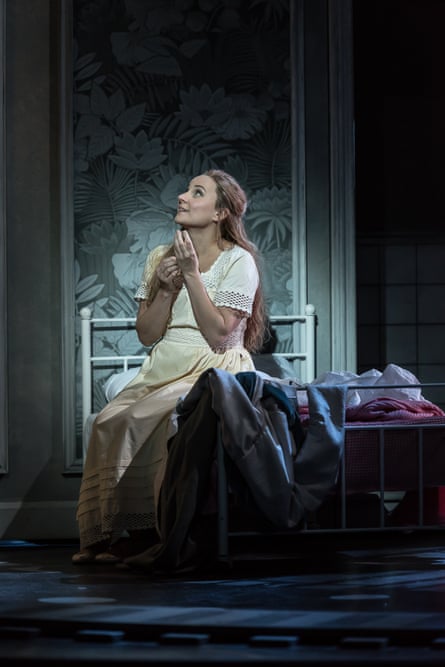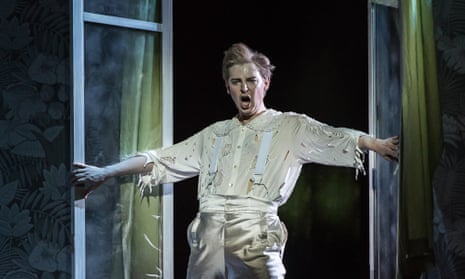Since it was first staged in Stuttgart 18 months ago, Richard Ayres’s Peter Pan has apparently been much revised, but as a piece of music theatre it remains deeply problematic. As an operatic subject, JM Barrie’s tale of the boy who never grew up would seem to be full of promise. The story works on so many levels, with so many shades of meaning and implication – from the childish and childlike to the deeply troubling – and is just the kind of narrative that opera can explore so well. But Ayres and his librettist Lavinia Greenlaw never make their dramatic intentions clear: is their Peter Pan a family opera, a pantomime for audiences of all ages (that’s the way Welsh National Opera seems to be marketing this UK premiere production), or is it an altogether darker, more psychologically probing treatment of the story, intended primarily for adults?
This lack of clarity has resulted in an opera that might end up leaving everyone feeling shortchanged. The dramatic pacing is very uneven, so that while there is less than two hours of music, it seems a much longer work. The attention of a younger audience might well wander during some of the longueurs, while adults will find the refusal to follow up some of the implications in the story, and the rather schematic way in so many of the characters are drawn, frustrating: there are too many loose ends, too many narrative shortcuts. There’s also a rather disconcerting change of focus at the climax, when the opera borrows the famous idea from Barrie’s stage play and Peter calls on the audience to help in reviving Tinkerbell. It’s an odd moment to come across in a piece of theatre that’s otherwise maintained a distance (sometimes an apparently tongue-in-cheek one) between the drama and those watching it, almost as if a tacit agreement had been broken.
Some of Ayres’s score is surprising, too – not because of the violent stylistic juxtapositions and dislocations that are so typical of his concert pieces and were an important element in his first opera, The Cricket Recovers (staged at the Aldeburgh festival), but through their absence. Janáček’s Cunning Little Vixen is certainly a stylistic reference point here, as it was for The Cricket Recovers; there are echoes of Stravinsky (Petrushka, especially), too, as well as occasional forays into other areas of music, including Broadway musicals. But it’s all rather subdued, almost respectful; even the way in which the vocal lines cut across the natural sense of the text in the set-piece arias for Mrs Darling, Wendy and Peter seems apologetic, never boisterous or really energised.
There are hints in Keith Warner’s staging that he had to search hard to find ways of energising the drama, too, and to come up with a convincing visual framework. Jason Southgate’s designs use only about two-thirds of the width of the Millennium Centre stage, so the action often seems cluttered and cramped; the pirates and the Lost Boys generally seem like extras from a Carry On film, and the evocation of Edwardian London through railway carriages seems an unnecessary gloss. The reinvention of the crocodile as half-reptile, half-grandfather clock is a wonderful idea, however, and the flying works splendidly.

Countertenor Iestyn Morris, who also took the title role in the Stuttgart premiere, is a suitably agile Peter, though the character’s mix of boastfulness and neediness never quite comes into sharp focus, any more than Marie Arnet’s Wendy can reconcile her role as surrogate mother to the Lost Boys with the fantasy that she weaves around Peter. Ashley Holland doubles as Mr Darling and Captain Hook, while Hilary Summers is Mrs Darling and a rather murderous Tiger Lily. There are so many possible layers, and so many of them are left unexplored in this opera.

Comments (…)
Sign in or create your Guardian account to join the discussion